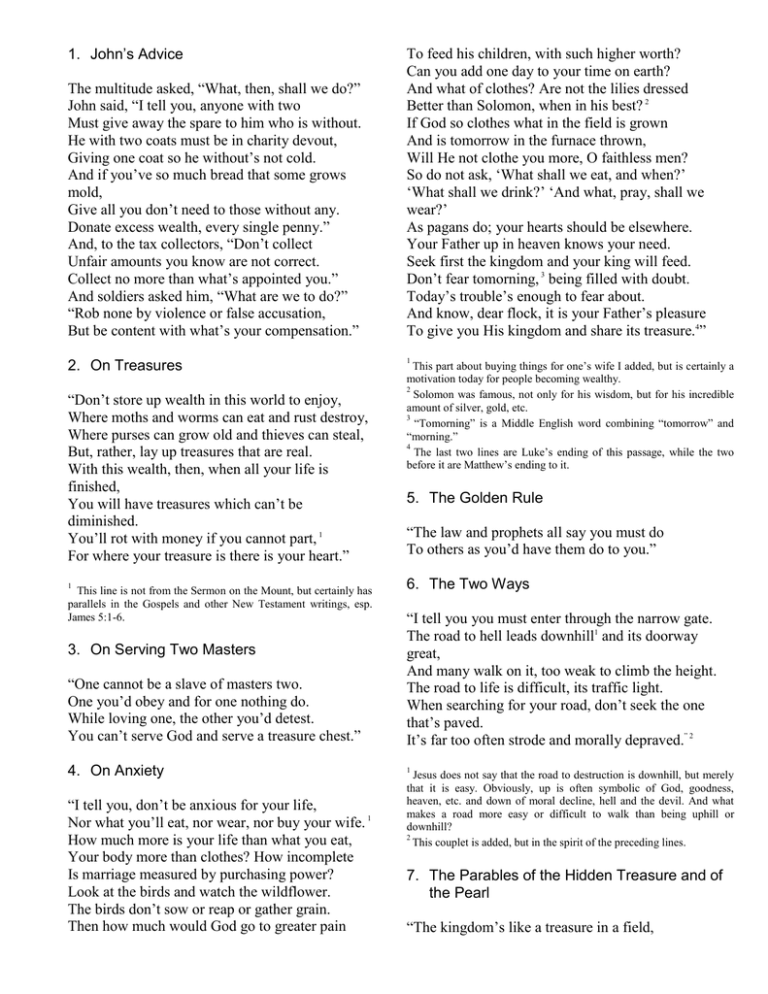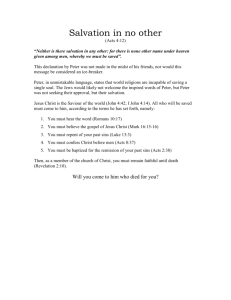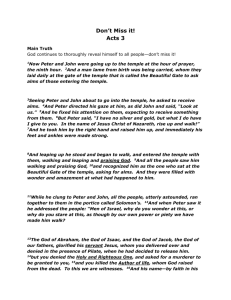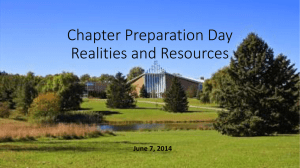John’s Advice 1. To feed his children, with such higher worth?
advertisement

1. John’s Advice The multitude asked, “What, then, shall we do?” John said, “I tell you, anyone with two Must give away the spare to him who is without. He with two coats must be in charity devout, Giving one coat so he without’s not cold. And if you’ve so much bread that some grows mold, Give all you don’t need to those without any. Donate excess wealth, every single penny.” And, to the tax collectors, “Don’t collect Unfair amounts you know are not correct. Collect no more than what’s appointed you.” And soldiers asked him, “What are we to do?” “Rob none by violence or false accusation, But be content with what’s your compensation.” 2. On Treasures “Don’t store up wealth in this world to enjoy, Where moths and worms can eat and rust destroy, Where purses can grow old and thieves can steal, But, rather, lay up treasures that are real. With this wealth, then, when all your life is finished, You will have treasures which can’t be diminished. You’ll rot with money if you cannot part, 1 For where your treasure is there is your heart.” 1 This line is not from the Sermon on the Mount, but certainly has parallels in the Gospels and other New Testament writings, esp. James 5:1-6. 3. On Serving Two Masters “One cannot be a slave of masters two. One you’d obey and for one nothing do. While loving one, the other you’d detest. You can’t serve God and serve a treasure chest.” 4. On Anxiety “I tell you, don’t be anxious for your life, Nor what you’ll eat, nor wear, nor buy your wife. 1 How much more is your life than what you eat, Your body more than clothes? How incomplete Is marriage measured by purchasing power? Look at the birds and watch the wildflower. The birds don’t sow or reap or gather grain. Then how much would God go to greater pain To feed his children, with such higher worth? Can you add one day to your time on earth? And what of clothes? Are not the lilies dressed Better than Solomon, when in his best? 2 If God so clothes what in the field is grown And is tomorrow in the furnace thrown, Will He not clothe you more, O faithless men? So do not ask, ‘What shall we eat, and when?’ ‘What shall we drink?’ ‘And what, pray, shall we wear?’ As pagans do; your hearts should be elsewhere. Your Father up in heaven knows your need. Seek first the kingdom and your king will feed. Don’t fear tomorning, 3 being filled with doubt. Today’s trouble’s enough to fear about. And know, dear flock, it is your Father’s pleasure To give you His kingdom and share its treasure.4” 1 This part about buying things for one’s wife I added, but is certainly a motivation today for people becoming wealthy. 2 Solomon was famous, not only for his wisdom, but for his incredible amount of silver, gold, etc. 3 “Tomorning” is a Middle English word combining “tomorrow” and “morning.” 4 The last two lines are Luke’s ending of this passage, while the two before it are Matthew’s ending to it. 5. The Golden Rule “The law and prophets all say you must do To others as you’d have them do to you.” 6. The Two Ways “I tell you you must enter through the narrow gate. The road to hell leads downhill1 and its doorway great, And many walk on it, too weak to climb the height. The road to life is difficult, its traffic light. When searching for your road, don’t seek the one that’s paved. It’s far too often strode and morally depraved.” 2 1 Jesus does not say that the road to destruction is downhill, but merely that it is easy. Obviously, up is often symbolic of God, goodness, heaven, etc. and down of moral decline, hell and the devil. And what makes a road more easy or difficult to walk than being uphill or downhill? 2 This couplet is added, but in the spirit of the preceding lines. 7. The Parables of the Hidden Treasure and of the Pearl “The kingdom’s like a treasure in a field, But buried and the place to one revealed. He covers it and sells all that he owns, To buy the dirt, for gold and precious stones. 1 Again, it’s like a man who searches for Great pearls in every marketplace and store. He found a great one. All he had was sold To buy a pearl worth his whole weight in gold. Such efforts will men make to get their treasures.” 8. The Parable of the Rich Fool Christ taught, “A rich man had such fertile land Its yield was greater than he ever planned. He said, ‘I’ve not room for my crops to store. What shall I do? I know! Since I want more, I’ll tear my barn down, build a giant one And be the envy of near everyone. For there I’ll store my grain and all I own And then I’ll say unto myself alone, 1 “My soul, you’re saved up for many a year So just relax, eat, drink, be of good cheer.”’ But God will say to him, ‘You fool! This night Your life will end and, as you lack foresight, You can’t take with you anything you stored.’ For those who are not rich towards the Lord And make pleasure and wealth their biggest goal Will wallets have as empty as their soul.” 1 I added the word alone to this passage because it struck me that the rich fool was not only talking to himself, but planning what he would be able to say to himself in the future. While I was writing this passage, I read an article in New York Newsday I thought very relevant. A Palestinian man had sent $150,000 home, while he was living in America, in order to build a large enough home for his extended family, a home that was subsequently destroyed by the Israeli army. The Palestinian man said that, while the American dream is to send your kids away to college and live without them, the Palestinian dream is to live with and break your daily bread with your extended family. 9. On Serving Two Masters “A subject only bows before one throne. No slave can serve two masters. If he tried, You know exactly what would soon betide. He’d love the second master and he’d hate the first, Or vice versa. Of all servants, he’d be the worst. One can’t to God and money be a slave. One master would condemn while one would save.” There was a rich man who was so well dressed His clothes and daily feasts made all impressed. Yet, at his gate, there was a man so poor He begged to eat what fell upon the floor. This Lazarus appeared so sad and sick That dogs came by just for his sores to lick. From hunger then the poor man passed away And he was brought to Abraham to stay Forever with his God and his forefather. And so died, too, the man who wouldn’t bother To feed this Lazarus. To hell he went, Where looking up above from his torment, He saw the two and called up, ‘Father, please! Send Lazarus my sufferings to ease! Have sympathy. Let him just wet his finger To cool my tongue. In agony I linger.’ ‘On earth, you lacked one drop of agape, So thirsty, unextinguished you must stay. In life, you had much more than you could need And you would not your starving brother feed. Your states have changed; this cannot altered be. Besides, a chasm divides you and he, Preventing those who would from one side cross.’ ‘Then, Abraham, if you can’t save my loss, Send Lazarus unto my brothers five, Who can be saved while they are still alive.’ ‘But prophets were already to them sent.’ ‘If one came from the dead, they would repent.’ ‘They listened not to what the prophets said, They’d still not hear should one rise from the dead.’” 11. The Blessings and Woes 1 “Blest are you poor, for in God’s kingdom you’ll reside. Blest are you hungry, for you shall be satisfied. Blest are you sorrowful, for you shall laugh, And most blest are you if, on My behalf, You’re driven out, detested, and abused, With all harsh words in your direction used. Rejoice that day, and leap in exultation. Who has a prophet’s hardship shares his station. Woe to you rich, who shall be always poor, While those who laugh and sneer smile no more. Great woe to those whose daily supper is a feast, Who shall know hunger pains of those who have the least. And woe to you when nice things people say, For false prophets were treated in this way. 10. The Parable of the Rich Man and Lazarus 12. The Rich Young Man A man ran up to Him, knelt down as if to plead, “Good teacher, life eternal is gained by what deed?” “Why do you call Me this? For only God is good. The Ten Commandments limit men to what they should: You shall not kill. You shan’t commit adultery. You shall not steal, nor shall you commit perjury. Do not defraud. Obey father and mother, And, as you love yourself, love one another.’” “All these have I observed since I was young.” 1 Christ said, “If truth is coming from your tongue, One virtue to be perfect you still lack. Go home, where your possessions you must pack To sell them all and give it to the poor. Then shall you have treasure for evermore. And once you’ve left it all, come, follow Me.” The man left sad, so burdened down was he. 1 One of the earliest Christian writers, known as Pseudo-Origen, retold this story and followed the rich young man’s claim to have observed the commands with “How do you say ‘I have kept the Law and the Prophets’? For it is written in the Law: ‘You shall love your neighbors as yourself.’ Yet many of your brethren, sons of Abraham, are clothed in filth, dying of hunger, but your house is full of good things, and none of it goes out to them.” This is, of course, not recorded in any of the gospels, but I think it gives a great insight into how this issue was originally viewed. It should also be noted that “Do not defraud” is in the original gospels, though not in the ten commandments. A famous saying in the early church was “A rich man is either a thief or the son of a thief.” 13. Jesus Overturns the Tables of the Money Changers As He was passing through, the city stirred, “This is the prophet and He speaks God’s word, Called Jesus, Christ, from Nazareth in Galilee.” Christ went into the Temple, furious to see The men by whom the oxen, sheep and doves were sold And those who gave men Jewish coins for Roman gold. He drove them out, using a whip of cord And all their coins, then, on the floor He poured. He overturned the tables, tossed seats in the air, “It’s written, ‘My house must be called a house of prayer,’ 1 Yet you are making it a robber’s den!”2 This greatly angered all the leading men, For blind and lame approached Him to be healed, And children’s excitement was not concealed. “Hosanna to the Son of David!” was their song. The scribes and chief priests saw this, “Tell them how they’re wrong.” So Jesus said to them, “Have you not read, ‘Out of the mouths of little babes is said The greatest praise that ever has been spoken.’?” 3 “For all these things You’ve thrown about and broken, For all the praise You’ve willingly received, What sign have You that You should be believed?” “Destroy this Temple and in just three days, What you have made mere rubble I will raise.” “You can rebuild what’s forty-six years taken? 4 If you think so, you grossly are mistaken.” Yet it was not the Temple they were in He meant, But to predict His body’s fate was His intent. 1 Isaiah 56:7. All adherents of Judaism in the Roman Empire were required to give one day’s wage each year to the Temple in Jerusalem. (Members from each community would go on pilgrimage to Jerusalem to bring this money.) The Temple tax was supposed to be used for the upkeep of the Temple, as well as for works of charity. Jesus is here accusing the Sadducees of corruptly using the money for their own ends. While in John’s gospel bringing Lazarus back from the dead was the final straw that caused Jesus’ death, the cleansing of the Temple was the final straw in the Synoptics. 3 Psalms 8:2. 4 Reconstruction of the Temple began in 19 BC, which would place this event at 28 AD. In John’s gospel, which gives us this historical detail, the cleansing of the Temple does not happen immediately before Jesus’ death, but at least two years before it. 2 14. The Generosity of the Poor Widow Christ sat down by the treasury and saw Crowds giving coins, as called for by the Law. The rich gave much, a poor widow a penny, And Christ said, “She has given more than any, For out of their abundance they are giving, While she has given her entire living.” 15. Jesus at the Sea of Tiberias Now one night Peter, the two sons of Zebedee, Thomas, Nathanael from Cana in Galilee, And two more followers together stood. Said Peter, “I’ll go fish. The skies look good.” They said to him, “We’ll go with you as well.” Yet they caught not one fish to eat or sell. When passed the night, stood Jesus at the shore, Though who it was remained to them obscure. He called, “My friends, have you not caught a thing?” “We’ve not!” “Then starboard should you your nets swing!” They did this and their nets became so full They hardly could together their nets pull. The follower Christ loved said, “It’s the Lord!” So Peter tied his garment with its cord And in the water leaped. The rest got in the boat And, since it could not hold them with the fish and float, They dragged the net a hundred yards to shore. When they reached land, they heard Jesus implore, “Come, eat with Me!” For He had fish and bread. “Bring some fish you just caught here,” Jesus said. So Peter helped them pull the net out of the sea. The fish therein numbered a hundred fifty-three.1 So they were shocked that their nets had not broken. “Come and eat breakfast with Me,” then was spoken. To find out who He was no one implored, For it was very clear it was the Lord. Then Jesus handed them some fish and bread And, after all of them were amply fed, Asked, “Peter, do you love Me more than others?” “You know I do.” “Then feed My lambs like brothers.” Again He asked, “Peter, in truth, do you love Me?” “I love You, Lord.” “Then tend My sheep most faithfully.” A third time Christ asked, “Simon, do you love Me?” So Peter said, “Your thoughts are leagues above me, You know I love You,” and this almost made him weep. So Christ looked deeply into his eyes, “Feed My sheep.” Then Jesus said, “I tell you in all truth You dressed and went where you willed in your youth. Yet when you’re old you shall stretch out your hands And dress and walk as someone else demands.” Thus Jesus told them how would end his story, How Peter’s death would give God His due glory. Then Christ said, “Follow Me. I’ll be your guide. I’m headed to the city where I died.”2 When Peter saw the one Christ loved behind, He asked, “Will his demise be as unkind? Will he be killed as well when comes his turn?” “Just follow Me. His end’s not your concern.” The rumor then began that he would never die, Yet only “It’s not your concern,” was His reply. 1 The number 153 is significant because that is how many known species of fish there were at the time of Jesus. 2 This line is an addition. In Matthew and Mark, the disciples are told to meet Him in Galilee, whereas Luke has them meet Jesus in Jerusalem. I needed to add this line to bring them to the following scene, in Jerusalem. 16. The Early Christian Community They held true to the teachings and the brotherhood, To breaking bread as kin and praying for the good. And the apostles left them filled with awe When signs and miracles the faithful saw. The brethren all sold everything that they possessed And everything was doled out, more to those hardpressed, For all they owned they shared communally. And with one heart they went to Temple constantly. They met in houses for the breaking of the bread, Where food was freely shared and praises to God said. Then all admired how their company behaved And daily did God add to those who would be saved. 17. The Final Judgment “The Son of Man shall come, enthroned in glory, To judge those from each land and territory, With angels ‘round Him, in rows hundreds deep, To sort mankind, as goats are rent from sheep. He’ll place goats on His left, sheep on his right, And tell the sheep, with eyes filled with delight, ‘Come to My Father’s kingdom, you most blessed, For whom God made a place for you to rest. For God can outdo all in gratitude. You saw Me hungry and you gave Me food. You saw Me thirsty and My thirst relieved, And from you needed shelter was received. You welcomed Me when I trod in a foreign land. When I laid sick in bed, you held onto My hand. You even came to visit when in prison. Come live the life the Lord made for the risen!’ The righteous then will ask this of their Lord, ‘When did we give what You could not afford? When did we visit You, in sickbed or in jail? When did we house You when You walked a foreign trail, Or give you clothes, not that we want to disagree?’ ‘What’s done for the least of My brethren’s done for Me.’ Then those placed on His left side will be cursed, ‘Be gone, for fates are only once reversed! For I was hungry, but you gave no food, A stranger far from home and you were rude. If naked, thirsty, locked in jail, or ill, The aid that I received from you was nil.’ The wicked then will ask Him in reply, ‘When did we charity for You deny?’ ‘If you let starve one single little child, 1 You have the wrath of the Almighty riled. To leave in need when help you can afford Is to abandon and forsake your Lord. To visit sick or those in jail you gave no time, No matter how they suffered or had done no crime. To foreigners, you cast them out as strangers, To face the cold and any other dangers. You passed the homeless with your pockets full. You saw them cold and sold your excess wool. They laid in rags, or naked as when they were born, And they only received your laughter and your scorn. For you cared not if God’s children were cold, If helping them meant lessening your gold. What crime is worse, when wanting to your wealth maintain, Than letting children in hunger and thirst remain? As thirsty as kids were, you let them thirst, With bellies swollen like they soon could burst. You saw their need and did not do a thing, And so deserve eternal suffering. You’ll burn in blazing flames throughout an endless age,’ He’ll tell these selfish people, with eyes filled with rage. They will be sent to the eternal fire, While selfless folk join God’s angelic choir.” 1 This 21-line response of Jesus is an expansion of the simple response 'Truly I say to you, to the extent that you did not do it to one of the least of these, you did not do it to Me.' (Mt. 25:45) I made a rare exception in taking this liberty because so many people are starving in this world while so many live in excess. I thought, since this passage has been so greatly ignored, its message must be shouted from the rooftops, so in my work adding passion to it was the best I could do.







